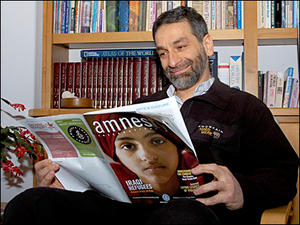TerrorismHead of Islamic charity sentenced to nearly three years
Last week the head of the U.S. arm of a now disbanded Islamic charity was sentenced to nearly three years in prison for sending $150,000 to Saudi Arabia to fund terrorist activities

Pirouz Sedaghaty, also known as Pete Seda // Source: katu.com
Last week the head of the U.S. arm of a now disbanded Islamic charity was sentenced to nearly three years in prison for sending $150,000 to Saudi Arabia to fund terrorist activities.
According to U.S. District Judge Michael Hogan, there was no direct evidence linking Pete Seda to terrorism and therefore could not apply the “terrorism enhancement” provision which could have sent Seda to jail for eight years.
Hogan did note that there was no doubt the money Seda had sent to Saudi Arabia was used to fund Islamic extremists battling the Russian army in Chechnya. As a result, Seda has been sentenced to thirty-three months in prison and ordered to pay the IRS $80,980 in restitution.
Acting U.S. Attorney Dwight Holton said federal prosecutors believed they had clearly demonstrated Seda’s links to terrorism, but respected the court’s ruling and were satisfied with the sentence.
“Money is the lifeblood of terrorist organizations,” Holton said. “We are working very hard to cut off that lifeline. Shutting down al Haramain internationally and here was an essential part of that.”
Seda, an Iranian-born U.S. citizen also known as Pirouz Sedaghaty, ran the U.S. branch of the Saudi Arabia-based al Haramain Islamic Foundation in Ashland, Oregon. In addition to his role as the head of the Islamic charity, he worked as a tree surgeon and was known as an outspoken proponent of peaceful Islam.
Last year Seda was convicted of tax fraud and conspiracy to defraud the government when he assisted a Saudi national in converting a donation from an English doctor into traveler’s checks. The Saudi man took the checks with him on flight back to his native country without declaring the money, and prosecutors have not been successful in forcing him to return to stand trial.
Meanwhile, last week, the Ninth U.S. Circuit Court of Appeals ruled that the U.S. Treasury Department had correctly identified the Oregon branch of al Haramain in 2004 as a financier of terrorist activities in Chechnya and Albania. But, the court also ruled that the department had improperly seized the group’s assets and violated the charity’s Fourth Amendment right by improperly using a blockade order to freeze the group’s assets without warrant.
Seda’s attorney, Steve Wax, said they planned to appeal both the convictions and the sentence.
Wax remained optimistic given that the judge did not use the terrorism enhancement provision.
“The most important issue with respect to the money going to Chechnya was the judge finding the government did not establish a link to Mr. Seda,” Wax said.
